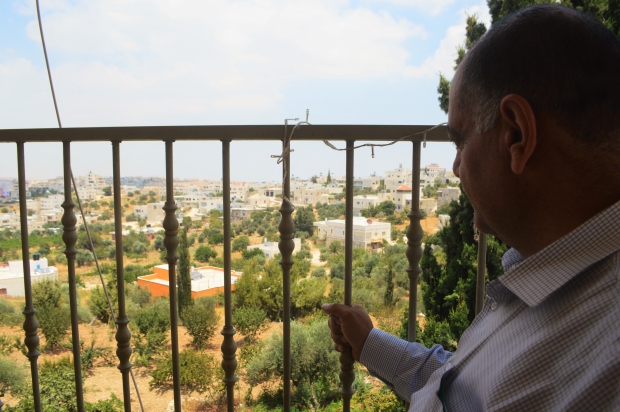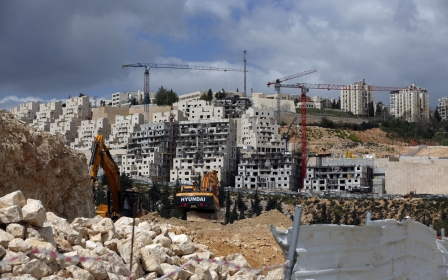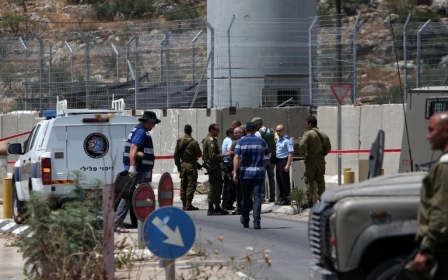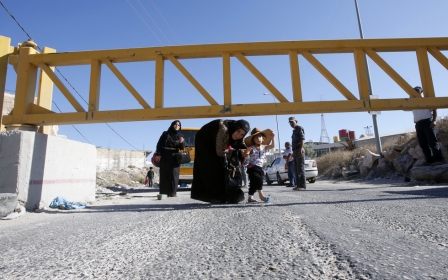Hebron villages under complete blockade as Eid arrives
HEBRON, Occupied West Bank - “Welcome to Bani Naim,” a large sign facing Route 60 reads, right in front of a massive dirt mound blocking the town’s main entrance. For the town's residents, the dirt mound might as well be concrete, as no one would dare move a grain of the dirt blockade installed by Israeli forces on Thursday.
Forces showed up to block the entrance to Bani Naim just hours after a 17-year-old resident identified as Muhammad Nasser Tarayra stabbed and killed a 13-year-old Israeli girl in her bedroom in the nearby Israeli settlement of Kiryat Arba.
Following the stabbing, nearly every village on the main route through the occupied West Bank’s district of Hebron was blockaded to various degrees, but the village of Bani Naim in particular is experiencing perhaps the most stringent closure in the area.
While some villages have Israeli forces guarding their entrances, checking IDs and controlling the comings and goings of residents, Bani Naim is on complete lockdown to all vehicular traffic.
On Tuesday morning a supply of cooking gas tanks was supposed to be delivered to the village, but instead of driving through and delivering the tanks to each home, three men gathered on top of the dirt mound and passed off the heavy gas tanks onto another truck on the other side that then distributed the gas.
“See our situation?” one of the men asked, hoisting a tank to an elderly man in the middle of the three. “This is crazy.”
Abdul Wahab, a private chauffeur from the village, told Middle East Eye that he has not made more than 50 shekels ($12.86) a day since the blockades went up.
“Before I was driving people to Bethlehem and Ramallah, the money was not great, I normally make just enough to feed and clothe my family because there is no work here,” he said. “But for the past week it’s been horrible, I am sitting at the entrance waiting for people who might need rides to their homes from the blocked entrances - there’s no real money in that.”
The chauffeur said the timing on the blockade was particularly unfortunate.
“It’s Eid tomorrow,” he said, referring to the largest Muslim holiday of the year. “But it feels like any other day. It will be more sad than a normal day actually, because it is supposed to be good and it won’t be.”
Abdul Wahab waited 20 years before he and his wife were finally able to conceive a child six years ago. As a father, he said he wants nothing more than to be able to give his son the best of everything. But life in Bani Naim is hard, and only made harder by the crippling blockade.
“Eid is a holiday for the children, usually I try to save enough money to make it special for my son, but so much business has stopped, so there is no money to make a good holiday for him now, and we don’t know how long this blockade will last, so we have to be careful with our money just like everyone else in the village.”
The mayor of Bani Naim, Mahmoud Manasrah, was quick to call the blockade collective punishment.
“This is one of many blockades imposed on the Palestinian people, but in Bani Naim most business relies on work outside the village. We have at least 50 factories for cutting stones that have been shut down. They employ at least 30 people each - that’s 1,500 people who have families to support. We have importers that can’t get out to sell their merchandise, farmers that can’t sell their produce,” Manasrah said. “It’s a mess but we will survive it.”
“Everyone in the village supports the family,” the mayor said, when asked if he thought there was any animosity held toward the family of the teenage attacker. “Everyone understands that this [closure] is part of the occupation.”
Since the beginning of the violent upheaval in October, Israeli forces have closed off various villages - from the northern Nablus town of Qabatiya, which was closed for several weeks, to the southern district of Hebron’s Tel Rumeida, which was closed for months. The closures came after attacks or attempted attacks by Palestinians against Israeli military forces and civilians, Israeli officials said.
Earlier last month, Yatta village, just a few miles away from Bani Naim, was closed for weeks after a deadly mass shooting in Tel Aviv committed by two Palestinian residents of the town. The attack left four Israelis killed and 16 others wounded. After Thursday’s stabbing in Kiryat Arba, Yatta was closed yet again.
At the time, Simon Reynolds, legal advocacy coordinator at the Bethlehem-based Badil Resource Centre for Palestinian Residency and Refugee Rights, said the mass blockading of Palestinian villages by Israeli forces could "be prosecutable as a war crime” under international law.
“The prohibition on collective punishment is strict and unequivocal under international humanitarian law,” Reynolds said.
According to the mayor, closing down villages is pointless and does nothing to discourage would-be attackers.
“These tactics don’t work,” the mayor of Bani Naim said. “We don’t know what the Israelis are trying to achieve by closing villages. The villagers here heard about what the boy did from the news. They have nothing to do with it, so why are they being punished?”
While the blockade is frustrating for residents of Bani Naim, the villagers have their essentials, and know how to depend on themselves.
“We will be okay - we don’t need food or aid. We are farmers here, we can sustain ourselves,” Manasrah said, pointing out at a bountiful garden of fruit and vegetables below his balcony.
“There’s no need for food, we just need our freedom.”
New MEE newsletter: Jerusalem Dispatch
Sign up to get the latest insights and analysis on Israel-Palestine, alongside Turkey Unpacked and other MEE newsletters
Middle East Eye delivers independent and unrivalled coverage and analysis of the Middle East, North Africa and beyond. To learn more about republishing this content and the associated fees, please fill out this form. More about MEE can be found here.





